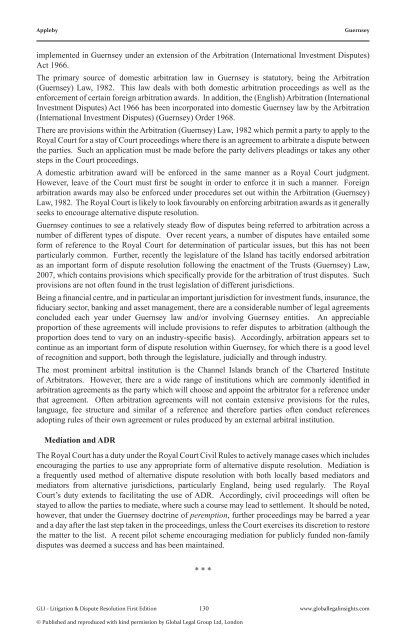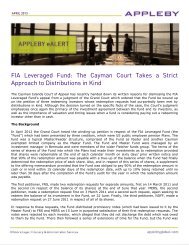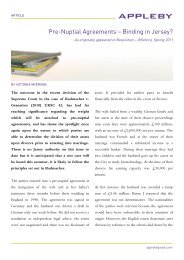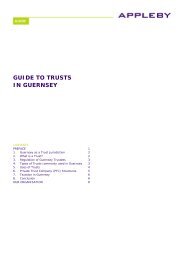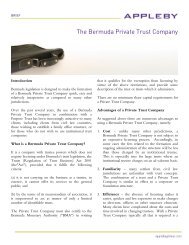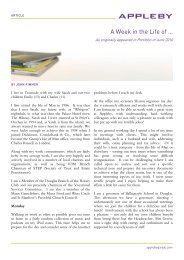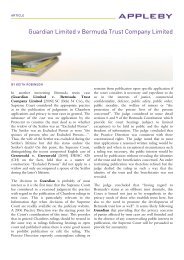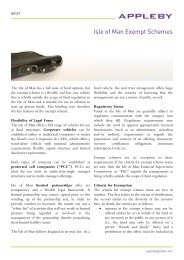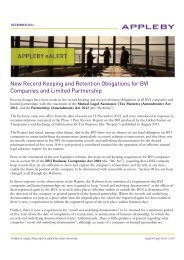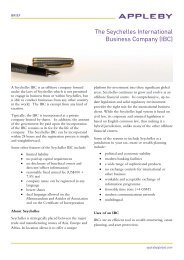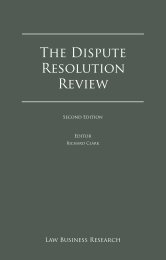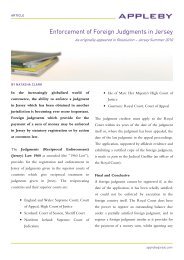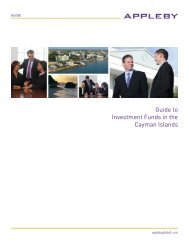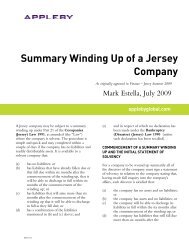Litigation & Dispute Resolution - Appleby
Litigation & Dispute Resolution - Appleby
Litigation & Dispute Resolution - Appleby
You also want an ePaper? Increase the reach of your titles
YUMPU automatically turns print PDFs into web optimized ePapers that Google loves.
<strong>Appleby</strong><br />
Guernsey<br />
implemented in Guernsey under an extension of the Arbitration (International Investment <strong>Dispute</strong>s)<br />
Act 1966.<br />
The primary source of domestic arbitration law in Guernsey is statutory, being the Arbitration<br />
(Guernsey) Law, 1982. This law deals with both domestic arbitration proceedings as well as the<br />
enforcement of certain foreign arbitration awards. In addition, the (English) Arbitration (International<br />
Investment <strong>Dispute</strong>s) Act 1966 has been incorporated into domestic Guernsey law by the Arbitration<br />
(International Investment <strong>Dispute</strong>s) (Guernsey) Order 1968.<br />
There are provisions within the Arbitration (Guernsey) Law, 1982 which permit a party to apply to the<br />
Royal Court for a stay of Court proceedings where there is an agreement to arbitrate a dispute between<br />
the parties. Such an application must be made before the party delivers pleadings or takes any other<br />
steps in the Court proceedings.<br />
A domestic arbitration award will be enforced in the same manner as a Royal Court judgment.<br />
However, leave of the Court must first be sought in order to enforce it in such a manner. Foreign<br />
arbitration awards may also be enforced under procedures set out within the Arbitration (Guernsey)<br />
Law, 1982. The Royal Court is likely to look favourably on enforcing arbitration awards as it generally<br />
seeks to encourage alternative dispute resolution.<br />
Guernsey continues to see a relatively steady flow of disputes being referred to arbitration across a<br />
number of different types of dispute. Over recent years, a number of disputes have entailed some<br />
form of reference to the Royal Court for determination of particular issues, but this has not been<br />
particularly common. Further, recently the legislature of the Island has tacitly endorsed arbitration<br />
as an important form of dispute resolution following the enactment of the Trusts (Guernsey) Law,<br />
2007, which contains provisions which specifically provide for the arbitration of trust disputes. Such<br />
provisions are not often found in the trust legislation of different jurisdictions.<br />
Being a financial centre, and in particular an important jurisdiction for investment funds, insurance, the<br />
fiduciary sector, banking and asset management, there are a considerable number of legal agreements<br />
concluded each year under Guernsey law and/or involving Guernsey entities. An appreciable<br />
proportion of these agreements will include provisions to refer disputes to arbitration (although the<br />
proportion does tend to vary on an industry-specific basis). Accordingly, arbitration appears set to<br />
continue as an important form of dispute resolution within Guernsey, for which there is a good level<br />
of recognition and support, both through the legislature, judicially and through industry.<br />
The most prominent arbitral institution is the Channel Islands branch of the Chartered Institute<br />
of Arbitrators. However, there are a wide range of institutions which are commonly identified in<br />
arbitration agreements as the party which will choose and appoint the arbitrator for a reference under<br />
that agreement. Often arbitration agreements will not contain extensive provisions for the rules,<br />
language, fee structure and similar of a reference and therefore parties often conduct references<br />
adopting rules of their own agreement or rules produced by an external arbitral institution.<br />
Mediation and ADR<br />
The Royal Court has a duty under the Royal Court Civil Rules to actively manage cases which includes<br />
encouraging the parties to use any appropriate form of alternative dispute resolution. Mediation is<br />
a frequently used method of alternative dispute resolution with both locally based mediators and<br />
mediators from alternative jurisdictions, particularly England, being used regularly. The Royal<br />
Court’s duty extends to facilitating the use of ADR. Accordingly, civil proceedings will often be<br />
stayed to allow the parties to mediate, where such a course may lead to settlement. It should be noted,<br />
however, that under the Guernsey doctrine of peremption, further proceedings may be barred a year<br />
and a day after the last step taken in the proceedings, unless the Court exercises its discretion to restore<br />
the matter to the list. A recent pilot scheme encouraging mediation for publicly funded non-family<br />
disputes was deemed a success and has been maintained.<br />
* * *<br />
GLI - <strong>Litigation</strong> & <strong>Dispute</strong> <strong>Resolution</strong> First Edition 130 www.globallegalinsights.com<br />
© Published and reproduced with kind permission by Global Legal Group Ltd, London


